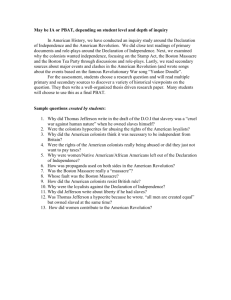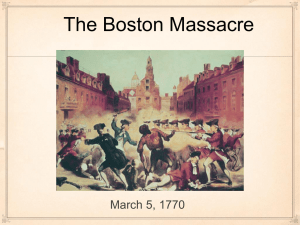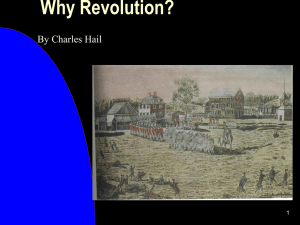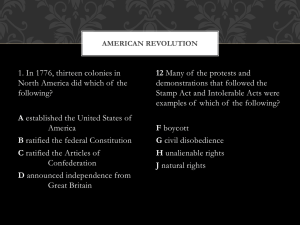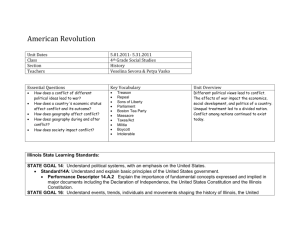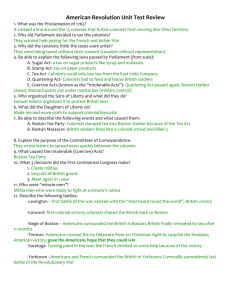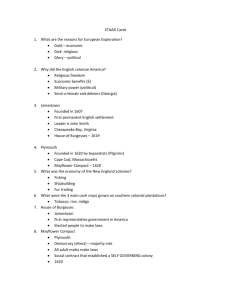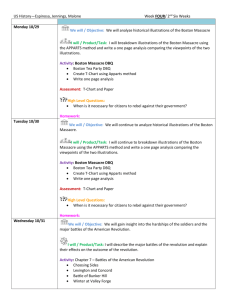Unit 3 - American Revolution Test Review
advertisement
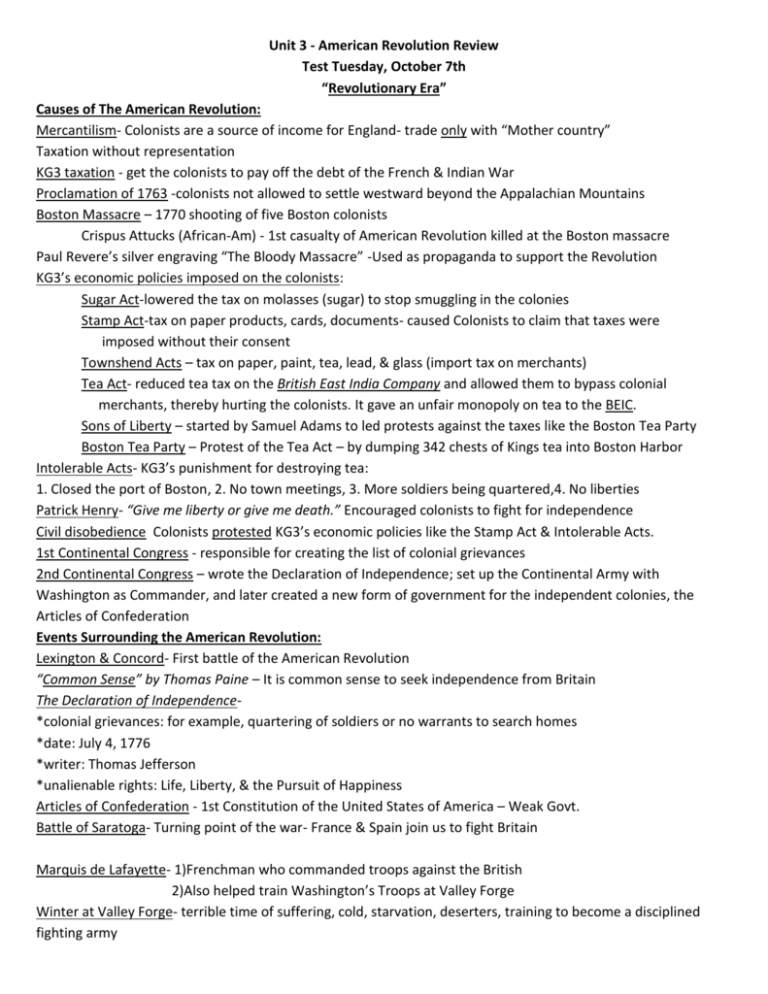
Unit 3 - American Revolution Review Test Tuesday, October 7th “Revolutionary Era” Causes of The American Revolution: Mercantilism- Colonists are a source of income for England- trade only with “Mother country” Taxation without representation KG3 taxation - get the colonists to pay off the debt of the French & Indian War Proclamation of 1763 -colonists not allowed to settle westward beyond the Appalachian Mountains Boston Massacre – 1770 shooting of five Boston colonists Crispus Attucks (African-Am) - 1st casualty of American Revolution killed at the Boston massacre Paul Revere’s silver engraving “The Bloody Massacre” -Used as propaganda to support the Revolution KG3’s economic policies imposed on the colonists: Sugar Act-lowered the tax on molasses (sugar) to stop smuggling in the colonies Stamp Act-tax on paper products, cards, documents- caused Colonists to claim that taxes were imposed without their consent Townshend Acts – tax on paper, paint, tea, lead, & glass (import tax on merchants) Tea Act- reduced tea tax on the British East India Company and allowed them to bypass colonial merchants, thereby hurting the colonists. It gave an unfair monopoly on tea to the BEIC. Sons of Liberty – started by Samuel Adams to led protests against the taxes like the Boston Tea Party Boston Tea Party – Protest of the Tea Act – by dumping 342 chests of Kings tea into Boston Harbor Intolerable Acts- KG3’s punishment for destroying tea: 1. Closed the port of Boston, 2. No town meetings, 3. More soldiers being quartered,4. No liberties Patrick Henry- “Give me liberty or give me death.” Encouraged colonists to fight for independence Civil disobedience Colonists protested KG3’s economic policies like the Stamp Act & Intolerable Acts. 1st Continental Congress - responsible for creating the list of colonial grievances 2nd Continental Congress – wrote the Declaration of Independence; set up the Continental Army with Washington as Commander, and later created a new form of government for the independent colonies, the Articles of Confederation Events Surrounding the American Revolution: Lexington & Concord- First battle of the American Revolution “Common Sense” by Thomas Paine – It is common sense to seek independence from Britain The Declaration of Independence*colonial grievances: for example, quartering of soldiers or no warrants to search homes *date: July 4, 1776 *writer: Thomas Jefferson *unalienable rights: Life, Liberty, & the Pursuit of Happiness Articles of Confederation - 1st Constitution of the United States of America – Weak Govt. Battle of Saratoga- Turning point of the war- France & Spain join us to fight Britain Marquis de Lafayette- 1)Frenchman who commanded troops against the British 2)Also helped train Washington’s Troops at Valley Forge Winter at Valley Forge- terrible time of suffering, cold, starvation, deserters, training to become a disciplined fighting army Serapis vs. Bonhomme Richard - sea battle- John Paul Jones’ ship the Bonhomme Richard was badly damaged when the Captain of the Serapis asked if he would surrender, he said “I have not yet begun to fight” and he managed to take control of the British ship as his ship sank. John Paul Jones – often considered the founder of the United States Navy Battle of Yorktown- last battle of the Am. Rev. British Gen. Cornwallis surrenders. Americans Win the War! Treaty of Paris (1783) – U.S. gains INDEPENDENCE. U.S. Boundaries North to Canada, South- Florida, WestMississippi River Men of the American Revolution: King George III – Passed taxes on colonies to help pay for French & Indian War -King of Britain during revolution, struggled to enforce royal authority over colonies Samuel Adams – Sons of Liberty leader, led opposition to Stamp Act & Boston Massacre Patrick Henry – spoke against the Stamp Act, “Give me liberty or give me death”, fought in the Continental Army Haym Salomon – Jewish immigrant, helped finance revolution, spy, helped prisoners escape Crispus Attucks – Died at Boston Massacre, African Amer., 1st casualty of the revolution Paul Revere – warned that the British were coming. He created silver engraving of Boston Massacre. William Dawes –warned that the British were coming Wentworth Cheswell – African- Am. Warned that the British were coming. Thomas Paine –wrote “Common Sense” to declare independence from KG3 Thomas Jefferson –wrote the Declaration of Independence John Locke – Unalienable rights, Life, Liberty, & Pursuit of Happiness John Trumbull - Painting of the signing of The Declaration of Independence George Washington – Surveyor, soldier, Continental Army Commander against the British, 1 & 2 Cont. Congress Benjamin Franklin – member of committee that wrote the Declaration of Independence Poor Richard’s Almanac James Armistead – Enslaved African-Am in Virginia. Recruited as a spy by Lafayette, contributed to Am. Victory at Yorktown John Paul Jones- “I have not yet begun to fight” “started the U.S. Navy” General Cornwallis – British general who surrendered at Battler of Yorktown Women of the American Revolution Abigail Adams- Urged Adams to remember women when writing the Const., argued for education for women Molly Ludwig Hayes- “Molly Pitcher” Brought water to men on the field & took over firing the cannon when husband passed out – Nickname spread to other women who helped. Women also spied. Deborah Sampson-disguised as a man fought in the American Revolution 18 months till injured Mercy Otis Warren- Writer – wrote one of the earliest histories about the Revolutionary War. Phillis Wheatley- 1st published African Am. Woman; taught to read & write by slaveholder’s daughter- poetry Esther de Berdt Reed -Organized fund raising for Rev. war $300,000. Sewed shirts (2,200) for soldiers ART Declaration of Independence by John Trumbull commissioned 1817 *Most paintings during the Revolutionary Era were portraits like Gen. Washington with his horse or Washington crossing the Delaware River. “The bloody massacre perpetrated in King Street Boston on March 5th, 1770 by a party of the 29th Regiment” engraved by Paul Revere
